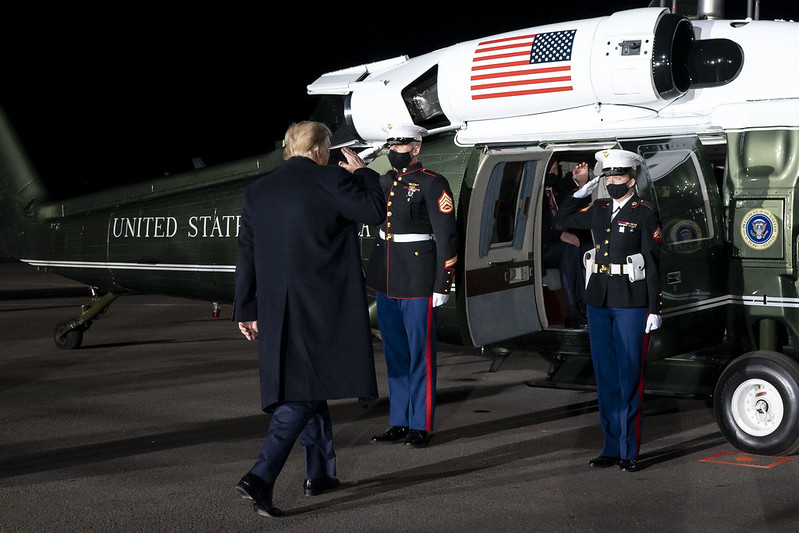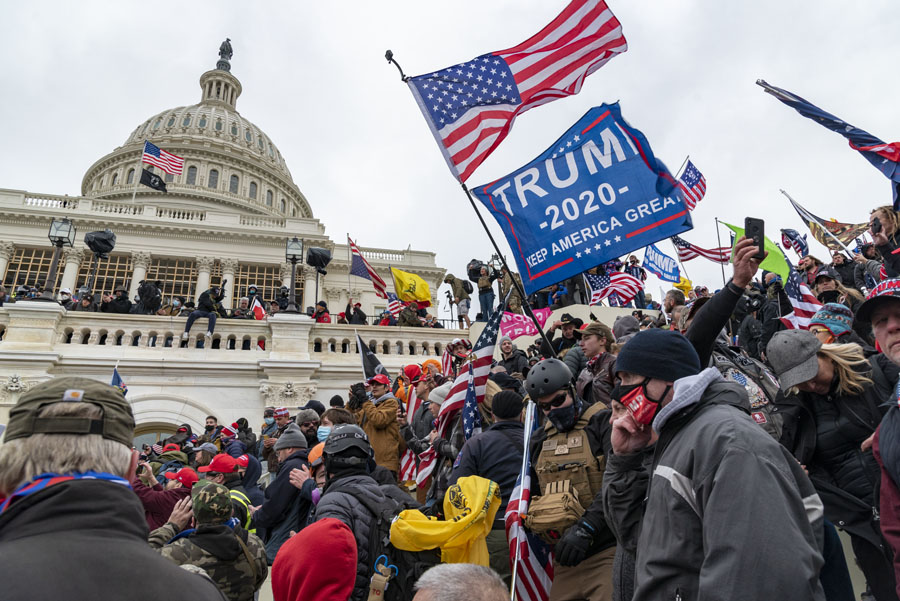A Practical Path to Condemn and Disqualify Donald Trump
The 14th Amendment path to holding Trump accountable is true to the facts and preferable procedurally, as compared to impeachment.

Time has come for Congress to contemplate how to hold Donald Trump accountable for his efforts to overthrow the election and incite an insurrection. After all, the last time American citizens made such a concerted, violent effort to overthrow U.S. leaders was in April 1865, when a group of conspirators murdered President Abraham Lincoln and attacked other members of his Cabinet.
As others have noticed, Congress can pursue either impeachment or the invocation of Section 3 of the 14th Amendment. Impeachment has gotten the bulk of public attention, but it’s fitting to take a closer look at Section 3. The 14th Amendment path is true to the facts and preferable procedurally, as compared to impeachment.
The 14th Amendment disqualifies any enemy of the Constitution of the United States from holding state or federal office if that person, as a public official, had previously taken an oath to support the Constitution. Congress has the duty to enforce the 14th Amendment and only Congress, “by vote of two-thirds of each House[,]” has the power to enforce the provision and to remove the disqualification.
How might Congress go about enforcing Section 3? It can simply decide in any manner it wishes, including a resolution adopted by majority votes, that Donald Trump has “given aid or comfort to the enemies” of the Constitution of the United States. The U.S. Senate, for example, refused to seat Zebulon Vance in 1871 when North Carolina elected him to the Senate because, as a former congressman, he had violated his former oath by serving the Confederacy.
In the extensive discussions of this option, for instance, by Gerard Magliocca and Daniel Hemel here on Lawfare, there are two points that may be missed in those thickets and that require emphasis.
First, the 14th Amendment does not require the Senate to conclude that Trump engaged in an insurrection. The amendment requires only that Congress conclude that Trump gave aid or comfort to enemies of the Constitution. This he did, both on Jan. 6 and in the broader context of the events after the presidential election of 2020.
The House of Representatives has already adopted this conclusion. The article of impeachment adopted by the House found that Trump violated his oath to defend the Constitution “by willfully inciting violence against the Government of the United States.” It also found that this conduct was “consistent with his prior efforts to subvert and obstruct the certification of the results of the 2020 presidential election.” Thus, the House concluded, “In all of this, President Trump gravely endangered the security of the United States and its institutions of government.”
Hemel’s explanation of the relevant standard confused matters a bit because he discussed how “aid and comfort” was defined under the criminal law of treason, which applies to enemies “of the United States.” The 14th Amendment is not identical to the criminal law of treason: It refers to enemies of the Constitution.
What America just experienced was an assault by enemies at home who, while claiming to be patriots, sought to override and thus overthrow the Constitution’s procedures for electing a president. Though he had sworn to defend the Constitution as a public official, Trump gave aid and comfort to these enemies of the Constitution. He thereby, under the 14th Amendment, disqualified himself from holding future office unless the Congress chooses to remove the disqualification by a two-thirds vote.
The House already voted that Trump aided these enemies. The Senate could therefore just concur with the House’s conclusion, by majority vote, in a resolution. To make the legal implication of this shared conclusion clear, the resolution could add that, by these actions, Donald Trump gave aid or comfort to enemies of the Constitution of the United States. This would explicitly invoke the 14th Amendment standard. Period.
Magliocca is reluctant to find power for a congressional finding because he believes some judicial involvement is needed to establish 14th Amendment disability. But the 14th Amendment expressly gives Congress the direct constitutional authority to enforce its provisions, including by legislation.
Some might worry that a congressional finding violates the constitutional prohibition on bills of attainder, a legislative act that pronounces an individual’s guilt of a certain crime. But the congressional finding is not a prohibited bill of attainder. It is not a criminal conviction. The criminal law of treason is a separate matter with its own burdens of proof and penalties.
Magliocca refers to the use of the bill-of-attainder argument by a then-Supreme Court justice, Salmon Chase. The issue came up in the treason trial case of Jefferson Davis. It was voiced by one of the two circuit judges considering the matter, Supreme Court Chief Justice Chase, who was there in his circuit-riding role. The U.S. government thought this argument was meritless, as did the other judge hearing the case and as did lead sponsors of the 14th Amendment itself. The circuit court was therefore split. The issue was not settled by the U.S. Supreme Court only because President Andrew Johnson pardoned Davis before the case could be heard.
The strangeness of the bill-of-attainder argument is underscored if one understands the historical background. Cynthia Nicoletti, a University of Virginia colleague who teaches both law and history, is the leading scholar on the Davis case. She told me she was “sort of tickled that Davis’s argument, which was cooked up by Chase and handed to his lawyers for Chase’s political gain, is being taken seriously. I always regarded it as pure nonsense. What’s really interesting to me is how it takes on a life of its own once it’s taken out of context and printed in the federal reports.”
Chase wanted to get rid of the Davis case. He had an ex parte meeting with Davis’s lawyers and suggested to them that they argue for dismissal of the indictment on the ground that the 14th Amendment had already assessed his criminal punishment and that his treason trial was therefore double jeopardy. When the government’s lawyers objected to the silliness of this claim, Chase acted as if he had not heard of the bill-of-attainder argument before. Davis’s main lawyer had his own theories about the motivations for Chase’s unusual intervention, which the court alluded to in a veiled way. Those who are interested should read Chapter 14 of Nicoletti’s book (especially pp. 293-300).
The main point, then, is that Congress can apply the 14th Amendment disqualification to Trump, by majority vote. This congressional action might eventually be challenged in court if Trump did run again and got on a ballot. The same would happen if someone who was not native born got on the ballot to run for president.
Those who want a fuller sort of accountability for Trump can make the political and legal argument that, if the votes may be there, impeachment might well be preferable. But an impeachment trial and acquittal might also be unfortunate if it fails, if it redoubles public confusion (why are they impeaching him if he is out of office?), or if it derails urgent congressional business. That is why I think it is important to maintain and develop the 14th Amendment option.
Such a 14th Amendment disqualification provides accountability, in both form and substance. It would formally condemn Trump for aiding enemies of the Constitution, as he did in trying to overthrow a lawful election and then inciting the insurrection. The finding would disqualify him from public office.





